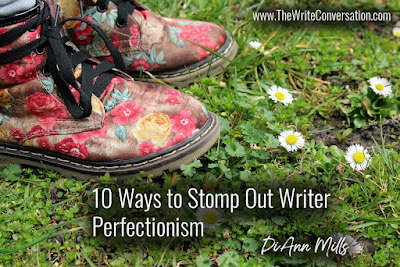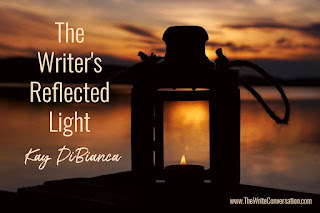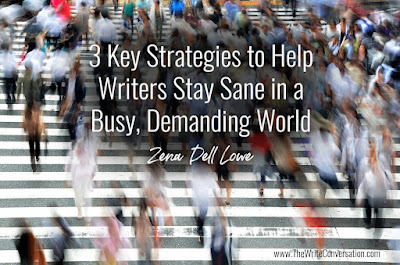Edie Melson's Blog, page 84
July 2, 2023
Why Bloggers Need to Be Ready for the Normal Ebb and Flow of Blogging Numbers

by Edie Melson @EdieMelson
"What am I doing wrong? My blog numbers are dropping?"
I’ve had a number of similar conversations every summer. They always begin the same way, with an inquiry about how he/she can improve the numbers that are dwindling at an alarming rate. These worried bloggers are certain they’ve either done—or not done—something to cause the drop in views, comments and shares. And my answer is always the same.
A drop in blogging numbers is normal during the summer.
My one-sentence assurance is rarely enough to calm a blogger’s nerves. And that’s understandable from someone who’s seen consistent growth through out the first of the year. So today, I’m going to break down the normal ebb and flow of blogging numbers throughout the calendar year, to help you evaluate the health of your own site.
NOTE: Blogging is an art, not a science. I can share what’s normal and expected, but remember there are always exceptions. If your blog is new, I suggest you also read my post on Reasonable Blog Growth.
A Blogging Breakdown Month-by-Month
January: This is usually a good month. People are ready to get back into a routine after the holidays. They’re also looking for information to fuel any New Year’s Resolutions.
February: The momentum of January has leveled off just a bit. You should still see some growth, but most people are already burned out on New Year’s Resolutions and back in the daily grind. They’re keeping up some new habits, but not quite as active.
March: Usually about the same as January.
NOTE: The numbers of this first quarter are also dependent on the weather. If it’s been an unusually harsh winter, with lots of power outages, you’ll not see as much growth or interaction.
April: This month brings with it the hint of spring fever and you’ll again see a boost in numbers
May: Surprisingly this is often a tough month. It’s the end of the school year, with lots of inherent activities. These activities bring a halt to the growth and interactions you’ve been nurturing. I think of May as a plateau month.
June: This is the beginning of the summer slump. People are outside more, away from computers. Your blog numbers will probably reflect this. Add to this the fact that you’re probably not as consistent with your own posting schedule and it does make sense.
July: You’re in the height of the summer slump. Now is NOT the time to second-guess what you’ve been doing. Wait until everyone is back from summer vacation and see what happens.
August: This month should see an end to the downward spiral. And the end of the month will be better than the beginning.
September: This month will be much like January. People are focused on once again getting back on a regular schedule and meeting goals before the end of the year.
October: Again a month of upward movement. Everyone wants to meet goals before the holidays start.
November: This month is August in reverse. The beginning of the month is strong, but when Thanksgiving draws near online activity dwindles.
December: Relax and enjoy the holidays, just like all your followers. Stay consistent, but don’t kill yourself because there’s very little you can do to increase your numbers.
I’ve been at this blogging thing a long time. I want you to have reasonable expectations and not get discouraged when normal slumps hit.
Now it’s your turn. What trends have you noticed on your own site? More importantly, what trends do you see regarding when you visit other sites? Be sure to leave your thoughts below.
Don’t forget to join the conversation!Blessings,Edie
TWEETABLEWhy Bloggers Need to Be Ready for the Normal Ebb and Flow of Blogging Numbers from @EdieMelson (Click to Tweet)
 Edie Melson is a woman of faith with ink-stained fingers observing life through her camera lens. She’s a writer who feels lost without that device & an unexpected speaker who loves to encourage an audience. She also embraces the ultimate contradiction of being an organized creative. She knows the necessity of Soul Care and leads retreats, conferences & workshops around the world on staying connected to God. Her numerous books, including the award-winning Soul Cares eries & reflect her passion to help others develop the strength of their God-given gifts. Her blog, The Write Conversation is recognized as one of the top 101 industry resources.
Edie Melson is a woman of faith with ink-stained fingers observing life through her camera lens. She’s a writer who feels lost without that device & an unexpected speaker who loves to encourage an audience. She also embraces the ultimate contradiction of being an organized creative. She knows the necessity of Soul Care and leads retreats, conferences & workshops around the world on staying connected to God. Her numerous books, including the award-winning Soul Cares eries & reflect her passion to help others develop the strength of their God-given gifts. Her blog, The Write Conversation is recognized as one of the top 101 industry resources. She and husband Kirk have been married 40+ years and raised three sons. They live in the foothills of the Blue Ridge Mountains and can often be found hiking—with Edie clinging to the edge of a precipice for the perfect camera angle and Kirk patiently carrying her camera bag and tripod. Connect with her on her website, WWW.EDIEMELSON.COM and through social media.
Published on July 02, 2023 22:00
For New Writers: Take Time to Grow

by Audrey Frank @AudreyCFrank
Part One in Seasons of Stewardship by Audrey Frank
Now Samuel did not yet know the Lord: The word of the Lord had not yet been revealed to him.1 Samuel 3:7
Samuel was a steward of words. But he did not begin that way. Samuel started as we all do. First, he was a child, and children need time to grow.
Samuel grew up in the house of the Lord, the fulfillment of a promise made by his mother Hannah. She had cried to the Lord in her barrenness, and the Lord listened, giving her a gift-son. She named him Samuel, “God has heard.”
Maybe in your life there was someone who cried to the Lord and you are the answer to that prayer. God hears, and He listens. He listens to the cry of the desperate (see Psalm 34). God gives good to those who seek His help.
So Hannah dedicated her good gift to the Lord and entrusted him to a wise mentor. One night Samuel heard a voice calling his name. Three times he arose, but found no one. The old priest instructed him, “The next time, answer, ‘Speak, Lord, your servant is listening’” (see 1 Samuel 3:10).
Samuel did as his teacher suggested, and the one named God Hears heard God for the first time.
Listening is the first stage of growth for those who would steward God’s words. We must allow time for growing. For listening. For resting, waiting for His voice, and making ourselves ready to handle the living and active, sharper-than-any-double-edged-sword, freedom-giving words of the Lord.
Speak, Lord, your servant is listening.
Writing words and speaking words are always best after listening. The season of listening is as critical to the word-harvest as rain and sunshine were to the strawberries spreading their scent across my favorite farm trail these summer days.
During the listening season, we need mentors. Old Eli perceived in Samuel what Samuel was not old enough to yet understand. The Lord was calling Samuel. Samuel listened to his mentor, and answered the Lord as instructed. Thus began Samuel’s next important stage of growing into a steward of God’s words.
Mentors help us grow into our next season of word-bearing. Make sure you don’t grow up too soon. Take time to grow and listen.
Lord, speak; your servant is listening. Amen.
Where are you in your writing journey today? Join me next month for Part Two in this series of Seasons of Stewardship.
TWEETABLEFor New Writers: Take Time to Grow, wisdom from author and speaker @AudreyCFrank on @EdieMelson (Click to Tweet)
 Audrey Frank is an author, speaker, and storyteller. The stories she shares are brave and true. They give voice to those whose words are silenced by shame, the hard things in life that don’t make sense, and the losses that leave us wondering if we will survive. Audrey and her family have spent over twenty years living and working among different cultures and world views, and she has found that God’s story of redemption spans every geography and culture. He is the God of Instead, giving honor instead of shame, gladness instead of mourning, hope instead of despair. Although she has three different degrees in communication and intercultural studies, Audrey’s greatest credential is that she is known and loved by the One who made her.
Audrey Frank is an author, speaker, and storyteller. The stories she shares are brave and true. They give voice to those whose words are silenced by shame, the hard things in life that don’t make sense, and the losses that leave us wondering if we will survive. Audrey and her family have spent over twenty years living and working among different cultures and world views, and she has found that God’s story of redemption spans every geography and culture. He is the God of Instead, giving honor instead of shame, gladness instead of mourning, hope instead of despair. Although she has three different degrees in communication and intercultural studies, Audrey’s greatest credential is that she is known and loved by the One who made her.Audrey is the author of Covered Glory: The Face of Honor and Shame in the Muslim World (Harvest House Publishers), an outpouring of Audrey’s heart to introduce others to the God of Instead. Shame is not unique to the developing world, the plight of the women behind veils, young girls trafficked across borders; shame is lurking in hearts everywhere. Through powerful stories from women around the world, Covered Glory illuminates the power of the Gospel to remove shame, giving honor instead. Available at favorite booksellers: BARNES & NOBLE , BOOKS A MILLION, AMAZON.
Featured Image: Photo by Timothy Eberly on Unsplash
Published on July 02, 2023 03:27
June 30, 2023
Etiquette Basics When Sharing Online Content

by Edie Melson @EdieMelson
A lot of people have asked me to share a blog post about the online etiquette for mentioning and/or sharing content online.
Mentioning and sharing content from sites we find valuable is the ultimate compliment, and a great way to encourage other bloggers and writers.
Before we begin, let me clarify something. Sharing links or a short quote from another site isn’t a copyright infringement.
The Basics of Sharing Online Content
The first thing we need to remember when sharing a link to content owned by someone else is that we are giving them free word-of-mouth recognition. It’s exactly like saying something nice about a physical business (or church, charity, school, etc.) and giving the address so the person you’re talking to can find it if they want to visit.Second, we never need to worry about sharing the title of something—blog post, article, book, website, etc. Titles cannot be copyrighted so there’s no way that can be construed ad negative behavior.Third, if someone has something visible to the public online, then it’s legal to share.
Etiquette BasicsWhen I’m sharing someone else’s content—either in social media or quoting them in a blog post or article—I do my best to make sure no one thinks I’m sharing something I created. For example, if I’m sharing DiAnn Mills’ blog post about Master Plotting, then I’m going to mention her name as the author.
For a blog post or article, it looks like my reference to DiAnn’s post in the paragraph above. I make sure those who read that sentence know I’m referring to something written by someone else.
In a social media update it looks like this:Great blog post from @DiAnnMills about Master Plotting on @BRMCWC http://www.blueridgeconference.com/master-plotting/
The social media update above lets readers know immediately that the material I’m referring to is written by someone else. It also goes a step further in that it also mentions the site where the material is presented. That’s only necessary if the site isn’t the website of the author. If the article written by DiAnn Mills was on DiAnn’s website, I wouldn’t have mentioned her twice.
Sometimes you won’t have room to mention the author and the website because of update-length restriction on certain platforms, like Twitter. In that case, use your discretion. I usually mention the author if I just have to choose one, but not always.
What NOT to DoThere are some things you’ll want to avoid doing—either because they’re poor etiquette or an outright violation of copyright.
1. Try to avoid mentioning a person, product, or place in a negative light. There may be times when you are tempted to bend this rule, but I recommend you do so only after a lot of thought and consideration. Don’t EVER post something negative without pausing to see if you’re ready to deal with the fallout.
2. Don’t repost someone else’s material without prior permission. You can quote a sentence or two from a blog post or article, but that’s it. After that, you need to contact the author and receive their permission. This is true even if they have an older blog and there’s a REPOST button still included.
The reason you don’t want to repost without permission is because of Google’s definition of plagiarism. Google considers defines any repeated post or article as plagiarism, even if it’s the author who is repeating the information.
3. If the information you want to share is in a private or limited membership group of any type, you should never share the information publically without prior permission. For example, many authors send out newsletters. The best newsletters contain additional information that the author doesn’t share publicly. Another example would be if you’re in a private Facebook group, information shared in those groups is implicitly understood to be PRIVATE. It’s the worst breach of etiquette to release the information from either source, publicly.
Bottom LineSharing a link to someone else’s—public—online work is a great thing to do. It’s one of the best ways to support another author. With these guidelines firmly in mind, you can share without fear of doing something wrong.
Now it’s your turn, do you have any questions about online sharing? Or, have you ever had a sharing experience you’d like to . . . uh . . . share? LOL!
Don’t forget to join the conversation!Blessings,Edie
TWEETABLEEtiquette Basics When Sharing Online Content, tips and tricks from @EdieMelson (Click to Tweet)
 Edie Melson is a woman of faith with ink-stained fingers observing life through her camera lens. She’s a writer who feels lost without that device & an unexpected speaker who loves to encourage an audience. She also embraces the ultimate contradiction of being an organized creative. She knows the necessity of Soul Care and leads retreats, conferences & workshops around the world on staying connected to God. Her numerous books, including the award-winning Soul Cares eries & reflect her passion to help others develop the strength of their God-given gifts. Her blog, The Write Conversation is recognized as one of the top 101 industry resources.
Edie Melson is a woman of faith with ink-stained fingers observing life through her camera lens. She’s a writer who feels lost without that device & an unexpected speaker who loves to encourage an audience. She also embraces the ultimate contradiction of being an organized creative. She knows the necessity of Soul Care and leads retreats, conferences & workshops around the world on staying connected to God. Her numerous books, including the award-winning Soul Cares eries & reflect her passion to help others develop the strength of their God-given gifts. Her blog, The Write Conversation is recognized as one of the top 101 industry resources. She and husband Kirk have been married 40+ years and raised three sons. They live in the foothills of the Blue Ridge Mountains and can often be found hiking—with Edie clinging to the edge of a precipice for the perfect camera angle and Kirk patiently carrying her camera bag and tripod. Connect with her on her website, WWW.EDIEMELSON.COM and through social media.
Published on June 30, 2023 22:00
June 29, 2023
12 Things That Can Confirm Your Call as a Writer

by Edie Melson @EdieMelson
Many of us hit places in our journey where we wonder if we're really cut out for writing. Insecurity and the general insanity of the business can whittle down our confidence until we're ready to throw in the towel. But there are some unexpected ways to confirm your calling, if you're willing to take a look at familiar things in different ways.
Today I'd like to share a list of things that can reverse that insecurity. If you find any of these familiar, you're definitely on the write . . . uh . . . right path.
12 Ways to Know You're Really a Writer
1. You look forward to the holidays and getting together with difficult relatives because it gives you more ideas for quirky characters.
2. Eavesdropping is a way of life—how else can you learn to write realistic dialogue?
3. You never go anywhere without a pen and paper—you never know when inspiration will hit.
4. Your husband bought you a digital voice recorder because he was afraid you’d wreck the car writing notes when inspiration hits.
5. You frequently act out scenes for your book, and even ask your family to participate.
6. Going too long without writing can bring on a case of hives.
7. Your personal computer has several files on how to commit the perfect murder.
8. You can’t pass a bookstore with going in.
9. Your spouse now sleeps with a mask on because you frequently flip on the light to take notes in the middle of the night.
10. When something funny happens to a family member, his/her first reaction is to beg you NOT to write about it.
11. Your frequently have conversations—out loud—with your character.
12. You have at least one non-writer friend who refuses to go to lunch with you any more—one too many discussions about how to poison someone.
Now I'd love to hear what you'd add to the list. What things confirm your calling to the writer's life?
TWEETABLE12 Things That Can Confirm Your Call as a Writer from @EdieMelson (Click to Tweet)
 Edie Melson is a woman of faith with ink-stained fingers observing life through her camera lens. She’s a writer who feels lost without that device & an unexpected speaker who loves to encourage an audience. She also embraces the ultimate contradiction of being an organized creative. She knows the necessity of Soul Care and leads retreats, conferences & workshops around the world on staying connected to God. Her numerous books, including the award-winning Soul Cares eries & reflect her passion to help others develop the strength of their God-given gifts. Her blog, The Write Conversation is recognized as one of the top 101 industry resources.
Edie Melson is a woman of faith with ink-stained fingers observing life through her camera lens. She’s a writer who feels lost without that device & an unexpected speaker who loves to encourage an audience. She also embraces the ultimate contradiction of being an organized creative. She knows the necessity of Soul Care and leads retreats, conferences & workshops around the world on staying connected to God. Her numerous books, including the award-winning Soul Cares eries & reflect her passion to help others develop the strength of their God-given gifts. Her blog, The Write Conversation is recognized as one of the top 101 industry resources. She and husband Kirk have been married 40+ years and raised three sons. They live in the foothills of the Blue Ridge Mountains and can often be found hiking—with Edie clinging to the edge of a precipice for the perfect camera angle and Kirk patiently carrying her camera bag and tripod. Connect with her on her website, www.EdieMelson.com and through social media.
Published on June 29, 2023 22:00
June 28, 2023
Find More Time To Write by Utilizing These 15 Tips

by Edie Melson @EdieMelson
I think one of the biggest obstacles writers face is finding the time to write. It's a common myth to think that time just magically appears.
Truthfully, we never FIND time to write, we have to carve out time to write.
That’s what separates the wanna-be from the professional.
Tips to Make Writing a Priority
1. Make an appointment. I’ve learned that if I don’t have it on my calendar, it doesn’t happen. For me, that’s true. My days fill up fast, but if I have a time scheduled to write, then it happens.
2. Quit with the guilt. For some reason we make everyone else’s dreams and goals a priority. Why do we neglect our own? Is God’s call less important because it’s me?
3. Get ready to make choices. Truthfully you can’t do it all. No one can. How important is writing to you? If you’re like me, you can’t live without writing. A day without writing feels like a failure. It’s the way I process life. But I still have to make choices.
4. Watch the clock (especially online). It’s not enough to sit down at the computer. We also have to turn off the Internet and actually write. Surfing social media doesn’t count. Reading blogs about writing doesn’t count. These are important parts of being an author, but they’re NOT writing!
5. Don’t go it alone. Yes, the act of writing is a solitary process. But you still need a tribe. We need encouragement, accountability, and honesty. As writers we’re not good at objective evaluation. We tend to swing between extremes. Either our writing feels like it’s brilliant, or it’s junk. We need the perspective other writers can bring to the table. And yes, they need to be writers. Non-writers don’t understand the process.
6. Evaluate your writing buddies. Yes, we all need writing buddies. But they need to be working writers. Not people who like to sit around and talk about writing. Make sure they’re people who understand the discipline and drive it takes to succeed. You need people who will hold you accountable, not people who’ll help you come with excuses not to write.
7. Be courageous. Failure isn’t the worst thing that can happen to a writer. Often failure teaches us more than success. The worst thing that can happen to a writer is to not write.
8. Learn to write when you don’t feel like it. This is one of the biggest differences between the professional and the amateur. The pros know you have to write whether you’re in the mood or not.
9. Be willing to write junk. So often you have to write junk to get to the jewels. The only thing you can’t fix is a blank page.
10. Schedule a write-in. Make a date, meet some friends at a local coffee shop and write. Having a group will spur you to higher word counts and amp up the accountability factor.
11. Build in rewards. When I set a goal, I like an incentive. So I build in small rewards for making word count.
12. Take a break. When I get stuck, it helps to do something. I take a short walk, do a quick chore like load the dishwasher. The physical action stimulates my mind. It's also healthy for your back.
13. Write in the spaces. Some days we only have short bits of time in which to write. It’s a myth that we have to have large chunks of time to get something done. An hour is still an hour, even if it’s broken into fifteen minute chunks.
14. Write regularly. When I started out, my kids were young. I couldn’t write during the daytime. So my husband and I worked out a schedule. I’d be with the family during the day and evening. When everyone went to sleep, I’d get back up and write until three or four o’clock in the morning. Then my husband would get the kids up and off to school in the morning while I slept in. It wasn’t a normal schedule, but it was a schedule.
15. Pray first. This one is the very most important tip. Pray when you're organizing your schedule, pray when the thought of writing pops into your head and pray when you sit down to write.
These are my tips to carve out time to write. What would you add to the list? Be sure to leave your thoughts in the comments section below.
Don’t forget to join the conversation!Blessings,Edie
TWEETABLEFind More Time To Write by Utilizing These 15 Tips from @EdieMelson (Click to Tweet)
 Edie Melson is a woman of faith with ink-stained fingers observing life through her camera lens. She’s a writer who feels lost without that device & an unexpected speaker who loves to encourage an audience. She also embraces the ultimate contradiction of being an organized creative. She knows the necessity of Soul Care and leads retreats, conferences & workshops around the world on staying connected to God. Her numerous books, including the award-winning Soul Cares eries & reflect her passion to help others develop the strength of their God-given gifts. Her blog, The Write Conversation is recognized as one of the top 101 industry resources.
Edie Melson is a woman of faith with ink-stained fingers observing life through her camera lens. She’s a writer who feels lost without that device & an unexpected speaker who loves to encourage an audience. She also embraces the ultimate contradiction of being an organized creative. She knows the necessity of Soul Care and leads retreats, conferences & workshops around the world on staying connected to God. Her numerous books, including the award-winning Soul Cares eries & reflect her passion to help others develop the strength of their God-given gifts. Her blog, The Write Conversation is recognized as one of the top 101 industry resources. She and husband Kirk have been married 40+ years and raised three sons. They live in the foothills of the Blue Ridge Mountains and can often be found hiking—with Edie clinging to the edge of a precipice for the perfect camera angle and Kirk patiently carrying her camera bag and tripod. Connect with her on her website, www.EdieMelson.com and through social media.
Published on June 28, 2023 22:00
June 27, 2023
10 Ways to Stomp Out Writer Perfectionism

DiAnn Mills @DiAnnMills
Writing perfectionists are seldom satisfied with their work, and the problem often stops them from experiencing productive publication. They offer reasons for their inability to move forward from the way they are wired, education, life experiences, and a host of other explanations.
Could it be these writers are using excuses in an attempt to step out of their human DNA? None of us are perfect writers, so friends, we need to get past it.
When we view writing not as an art but as the perfect story, the result is a book without passion, emotion, or human frailty. The solution is to take a break and evaluate who we are and why we’ve allowed the demon called perfectionism to threaten our God-given gift.
Our self-worth is not tied up in a perfectionist/performance trap.
For the record, friends, neither is our self-worth wrapped up in book sales. Or is it based on how many rewrites, edits, writers we mentor, conferences we attend or teach, social media numbers—I think you get the picture. Our self-worth is based on our relationship with God and how we love others.
The key is to accept who we are, our strengths and our limitations, and move forward with an attitude of grace. To move forward improving our craft, not demanding perfection.
But it’s not easy.
Here are 10 ways I’ve found to rid our perfectionism and choose acceptance.
1. Accept I am human, and humans are imperfect creatures who must learn to forgive themselves and others. I’m not an exception, but a member of a beautiful collection of people. I do not have to be in control, and I can say no.
2. Accept I am unique and not to be compared with any other person or writer on the planet. I am loved by God and myself. He has made me unique. I treasure the time spent with Him.
3. Accept I can finish a project with definite steps and organization, but the project doesn’t define who I am. Everything will get done in due time, and we can plan for it. But if we fail, that’s okay. Through the process we learn how to better ourselvs.
4. Accept I can receive constructive criticism and develop strength from my mistakes and failures, not dissolve into a puddle of self-imposed worthlessness.
5. Accept I can take time for myself to enjoy life and those people special to me. I need time to rejuvenate. We all need to recharge. Get outside, view the majesty, and breathe in God’s creation.
6. Accept I can walk away from rejection and still be valued and worthy of love.
7. Accept I can laugh at myself and the world. Humor is a biblical and scientific salve for all ailments.
8. Accept realistic goals and dream.
9. Accept I must take care of myself, physically, mentally, and spiritually.
10. Accept the value of transparency. I can reach out to others when I’m down, need to brainstorm, or simply need to hear another’s voice.
Perfectionism—a nasty trait that holds too many of us captive. Break out of those chains and set yourself free!
How do you fight the tendency to be perfect?
TWEETABLE10 Ways to Stomp Out Writer Perfectionism from author @DiAnnMills on @EdieMelson (Click to Tweet)
 DiAnn Mills is a bestselling author who believes her readers should expect an adventure. She creates action-packed, suspense-filled novels to thrill readers. Her titles have appeared on the CBA and ECPA bestseller lists; won two Christy Awards; and been finalists for the RITA, Daphne Du Maurier, Inspirational Readers’ Choice, and Carol award contests.
DiAnn Mills is a bestselling author who believes her readers should expect an adventure. She creates action-packed, suspense-filled novels to thrill readers. Her titles have appeared on the CBA and ECPA bestseller lists; won two Christy Awards; and been finalists for the RITA, Daphne Du Maurier, Inspirational Readers’ Choice, and Carol award contests. She is the former director of the Blue Ridge Mountain Christian Writers Conference, Mountainside Marketing Retreat, and Mountainside Novelist Retreat with social media specialist Edie Melson. Connect here: DiAnnMills.com
Published on June 27, 2023 22:00
June 26, 2023
Dipping the Quill Deeper: Cliques

by Eva Marie Everson
As my journey into the questions God asked within the Holy Writ continues, I came across this question asked by Jesus during His earthly ministry.
If you are kind only to your friends, how are you different from anyone else? Even pagans do that.
That’s the New Living Translation. Look now at Matthew 5:47 again in the Berean Literal Bible.
And if you greet only your brothers, what extraordinary are you doing? Do not even the Gentiles do the same? (emphasis, mine)
I visited my cousin’s church recently. A well-maintained country church set under the shade of massive live oaks that spread their branches so wide you have to squint to see the sun as it attempts to filter through. Along the sanctuary walls are stained-glass windows depicting various events in the life of Christ. When the sun finally does make it through the leaves and branches, colors like those from an 8-crayon box of Crayola cast prisms over the padded pews. It’s like Christmas every day.
I’d attended the church several times before and knew a handful of folks. On this visit, I walked into the sanctuary alone. A woman greeted me near the door as if she’d known me forever, but we’d not seen each other for decades.
“Do I know you?” I asked. “I meet a lot of people, so I—”
“No,” she said, the warmest smile encouraging my own. “But you look like someone I’d like to know.”
Well, if that wasn’t the sweetest thing . . . I instantly felt as if I knew the entire congregation.
Conference Season #2
We Christian writers have just come through one conference season and entered another. After spring/summer session, there will be fall session and then we’ll grow quiet for a few months before winter/spring session starts up again.
We attend these events for several reasons. We want/need the knowledge gleaned during the workshops. We want/need the inspiration received from the keynote speakers. (Let’s face it; sometimes those keynotes are like water after a trek across the desert’s hot sands.) We also, being pretty much lone wolves, want/need the time with “our people.” They get us like no one else does or can. We also, as professionals, want/need the networking within the industry. It’s true; in this profession, it’s not just what you know, but who you know.
There’s a First Time for Everything
Do you remember your first writers conference? I do. I was absolutely terrified, telling myself the entire flight up to “pretend you know what you’re doing. If you pretend well enough, they won’t ever catch on that you have no idea what you’re doing.”
Did I mention I was on faculty? Yep. That’s right. My first writers conference was spent as a faculty member.
Yesterday, I spoke to a Word Weavers president about one of her members who would be attending the Blue Ridge Mountains Christian Writers Conference for the first time. Let me rephrase that: this was his first conference ever. Can you imagine? Blue Ridge as your first conference? Not that it matters. The “I have no idea what I’m doing” or “I have no idea what I’m doing here” is the same whether there are 50, 100, or 600 people in attendance.
I admit, it’s easy to see those familiar faces—those we’ve waited months to see again—and within a few hugs, retreat to hang out for the next few days within our cliques. I think of it as familiarity within a sea of scary unknown, even for the old hats.
But let me encourage you, those of you who are the “old hats” or the “moderately broken-in hats,” to do as Jesus asked: greet more than those you know already. Welcome those who haven’t become your friends. Yet. Look for the “deer caught in the headlights” appearance on your fellow conferees and draw them in, assuring them that all will be well.
We, most of us, may be Gentiles, but we are not pagans. We are Christians. We are writers. We are Christian writers.
Go one step further: be extraordinary Christian writers.
TWEETABLEDipping the Quill Deeper: Cliques from author @EvaMarieEverson on @EdieMelson (Click to Tweet)
 Eva Marie Everson is the CEO of Word Weavers International, the director of Florida Christian Writers Conference, and the contest director for Blue Ridge Mountains Christian Writers Conference. She is the multiple award-winning author of more than 40 books and countless articles and blogposts. She is also an award-winning speaker and a Bible teacher and the most recent recipient of the AWSA Lifetime Achievement Award (2022).
Eva Marie Everson is the CEO of Word Weavers International, the director of Florida Christian Writers Conference, and the contest director for Blue Ridge Mountains Christian Writers Conference. She is the multiple award-winning author of more than 40 books and countless articles and blogposts. She is also an award-winning speaker and a Bible teacher and the most recent recipient of the AWSA Lifetime Achievement Award (2022). Eva Marie is often seen at writers conferences across the States. She served as a mentor for the Jerry B. Jenkins Christian Writers Guild and taught as a guest professor at Taylor University in 2011. She and her husband make their home in Central Florida where they enjoy their grandchildren. They are owned by one persnickety cat named Vanessa.
Eva Marie's latest book, THE THIRD PATH, takes a look at 26 of the questions God asked in the Bible, then makes them personal to the reader. The premise of the book is currently her most asked for continuing workshop at writers conferences.
Published on June 26, 2023 22:00
June 25, 2023
4 Writerly Types—Which One Fits You Best

by Ane Mulligan @AneMulligan
Mary Poppins: The Intuitive Writer
Mary sits down, opens a new document and starts her first draft without anything but a kernel of an idea. As she writes, she populates her story with new characters and situations. And somehow, with a spoonful of sugar, everything comes to a happily-every-after ending. Granted, she will have a lot of editing to do. She must go back and weave in those characters who suddenly popped up. She'll have to edit in some background (Q-Factor) for a rescue that would be implausible without foreshadowing. But in the end, Mary Poppins always succeeds.
Indiana Jones: The Seat-of-the-pants Writer
Indiana is different from Mary Poppins in that he has a goal in mind. He knows the end of the story. He also knows some of the stops he has to make along the way to reach it and get the prize. He knows his hero, having done a little background on him. He has the antagonist in mind but knows another might pop up, so he keeps his options open. What he doesn't do is a detailed outline. He can't follow one. So he has a vague "map" containing the beginning, the middle, and the end. The middle is rather sparse, since he doesn't know the terrain yet.
Rocky Balboa: The Plotter
Rocky knows exactly what he must do to win. He writes a detailed outline, chapter by chapter, then fills in the details. His outline is close to a first draft by the time he's done. Then, all he has to do is fill in all the details and flesh out the scenes. Rocky doesn't have to do as much content editing as Mary or Indiana. His greatest creativity comes in the outline. His story is in there.
Scarlett O'Hara: The Planster
Scarlett falls somewhere in between the others. She has a goal and she knows what it will take to get there but isn't always sure how that will happen. So, she sets down a vague outline, sparse in detail. As long as she can get to point A, then she can figure out how to get to point B. Scarlett spends more time in character preparation. She writes her heroine's backstory to learn her secrets. By the time she starts writing the story, she knows her characters well. She knows how they will react to any given situation. Scarlett has the fun of Indiana or Mary in discovery, but she also has somewhat of an outline to follow, in case she gets blocked.
These are the four types of writers I've identified. Where do you fall? And is there another type I've missed? Please join the conversation!
TWEETABLE4 Writerly Types—Which One Fits You Best from @AneMulligan on @EdieMelson (Click to Tweet)
 Ane Mulligan lives life from a director’s chair, both in theatre and at her desk creating novels. Entranced with story by age three, at five, she saw PETER PAN onstage and was struck with a fever from which she never recovered—stage fever. One day, her passions collided, and an award-winning, bestselling novelist immerged. She believes chocolate and coffee are two of the four major food groups and lives in Sugar Hill, GA, with her artist husband and a rascally Rottweiler. Find Ane on her website, Amazon Author page, Facebook, Instagram,Pinterest, The Write Conversation, and Blue Ridge Mountains Christian Writers Conference Blog.
Ane Mulligan lives life from a director’s chair, both in theatre and at her desk creating novels. Entranced with story by age three, at five, she saw PETER PAN onstage and was struck with a fever from which she never recovered—stage fever. One day, her passions collided, and an award-winning, bestselling novelist immerged. She believes chocolate and coffee are two of the four major food groups and lives in Sugar Hill, GA, with her artist husband and a rascally Rottweiler. Find Ane on her website, Amazon Author page, Facebook, Instagram,Pinterest, The Write Conversation, and Blue Ridge Mountains Christian Writers Conference Blog.
Published on June 25, 2023 22:00
June 24, 2023
The Writer's Reflected Light

by Kay DiBianca @KDiBianca
God spoke our world into being, and the first words we hear Him say in Genesis Chapter One are, “Let there be light.” Light is symbolic of many things in Scripture, all of them good. Some of these are
Guidance: “Your Word is a lamp to my feet and a light to my path.” –Psalm 119:105
Understanding: “The unfolding of your words gives light; it gives understanding to the simple.” –Psalm 119:130
Holiness “Arise, shine, for your light has come, and the glory of the Lord has risen upon you.” –Isaiah 60:1
Righteousness: “Commit your way to the Lord; trust in him, and he will act. He will bring forth your righteousness as the light, and your justice as the noonday.” –Psalm 37:5-6
Hope “Having the eyes of your hearts enlightened, that you may know what is the hope to which he has called you, what are the riches of his glorious inheritance in the saints,” --Ephesians 1:18
Salvation: “Again Jesus spoke to them, saying, ‘I am the light of the world. Whoever follows me will not walk in darkness, but will have the light of life.’” –John 8:12
Discipleship: “In the same way, let your light shine before others, so that they may see your good works and give glory to your Father who is in heaven.” –Matthew 5:16
* * *
Lately, I’ve been reading about the menorah, the golden lampstand that the Lord instructed Moses to build and place inside the Tabernacle. The Hebrew word “menorah” translates to the English “lamp.”
The menorah was to be forged from a single piece of gold, and the design was specific: it would have a central shaft and three branches on each side for a total of seven. I’ve read that this design represents the seven days of creation, with the central shaft denoting the Sabbath.
According to Exodus 25:37, God continued his instruction: “You shall make seven lamps for it. And the lamps shall be set up so as to give light on the space in front of it.”
The menorah illuminated the Tabernacle with God’s light. But it required the work of the priests to keep the candles burning.
“ In the tent of meeting, outside the veil that is before the testimony, Aaron and his sons shall tend it from evening to morning before the Lord.” – Exodus 27:21
Of course, God could have caused a miracle so that there was always supernatural light inside the Tabernacle, but instead, He commanded the priests to partner with Him to keep His light shining. It was both a wonderful privilege and an enormous responsibility.
* * *
It isn’t a great leap to see how God calls each of us to reflect His light to a dark world. As authors, we’ve been given the gift of words. Just as it was the priests’ job to replenish the oil in the menorah, we’re responsible for using words to keep the light of truth alive.
Through our understanding of language, we have the opportunity and privilege to partner with God to enlighten our world. Each day, we kindle the flame to reflect His light through our words.
Don’t let the fire go out.
TWEETABLEThe Writer's Reflected Light from @KDiBianca on @EdieMelson (Click to Tweet)
 Kay DiBianca is a former software developer and IT manager who retired to a life of mystery. She holds an M.S. in Computer Science from the University of North Carolina and uses her love of problem-solving to create intricate webs for her characters to untangle as they search for the truth while dealing with the ongoing challenges of faith and family.
Kay DiBianca is a former software developer and IT manager who retired to a life of mystery. She holds an M.S. in Computer Science from the University of North Carolina and uses her love of problem-solving to create intricate webs for her characters to untangle as they search for the truth while dealing with the ongoing challenges of faith and family. Kay has three published mystery novels in The Watch Series: The Watch on the Fencepost, Dead Man’s Watch, and Time After Tyme. Her published short stories include Lady Pilot-in-Command, The Clutter Busters, and The Money Tree.
Kay is a member of the American Christian Fiction Writers, Sisters in Crime, and the Collierville Christian Writers Group. She is also a regular contributor to the Kill Zone Blog. An avid runner, she can often be found at a nearby track, on the treadmill, or at a large park near her home
Kay and her husband, Frank, live, run, and write in Memphis, Tennessee. You can connect with Kay at https://kaydibianca.com.
Published on June 24, 2023 22:00
June 23, 2023
3 Key Strategies to Help Writers Stay Sane in a Busy, Demanding World

by Zena Dell Lowe @ZenaDellLowe
One of the hardest things I’ve had to learn as a human being is what to do when I’m in over my head. I’m talking about those times in life when I feel so overwhelmed by all the various things vying for my time and attention that I can hardly function, much less write.
At times like these, I know I’m going to fail even before I get started because there’s simply no way for me to accomplish everything I need to do. Assuming that you have either experienced this phenomenon yourself in the past, or that you will experience it at some point in the future, I wanted to share a few practical “action steps” that may be helpful. 3 Things that Help Writers Cope During Busy Times
1. Recognize that you simply can’t do everything, and darn it, that’s okay!
This sounds so obvious, and yet, how many of us actually “admit” it when we’re drowning or in the weeds? Oh, sure, we’ll moan and gripe about it to our friends, but this isn’t the same thing as acceptance. Most of the time we’re just complaining without really intending to make a change.
The fact of the matter is we only have so much mental and emotional bandwidth at our disposal. We have no choice but to work within the parameters of whatever time and energy we’ve been given. Unfortunately, this means that some things just aren’t going to get done -- or, at least, they aren’t going to get done as often or as fast or as thoroughly as we would like.
For example, one of my goals at The Storyteller’s Mission was to write a weekly digest for writers. You know, a weekly email for my subscribers with lots of great writing advice and tips. Well, it didn’t take me long to realize that I was in WAY over my head. I had to recognize that the demands of The Storyteller's Digest exceeded the time I was able to allot to it each week. And so, I don't send a weekly digest anymore. But instead of beating myself up about it, I’ve altered my expectations. Maybe I can’t send a digest every WEEK, but by gum, I can send one every MONTH. Further, I can make sure that when I DO send one, that it’s actually good!
If I tried to deny my limitations and insisted on following through on a weekly digest, then I'd be sending out a crappy weekly digest! And NOBODY wants that. So, let us humbly accept the limits of our humanity and purpose in our hearts to do the very best we can with what we have. Then, instead of berating ourselves, we can celebrate the stuff that we DO manage to accomplish. And as for the rest of it, well, we’ll just have to turn it over to God and trust Him with the outcome.
2. Make some hard choices.
One of the most important things you can do for yourself and your mental health is to limit your total number of commitments. Since you can't possibly do everything, you have to start saying NO to certain things, or eliminating some things altogether.
Remember, if you over-commit yourself, you’re not going to be able to do any of it with excellence anyway. So, you’re not doing anyone any favors by saying yes to something that you simply won’t have time to do well. Instead, you need to take an honest inventory of all the things on your plate, and then start removing the things that eat away at your precious time and energy but offer very little value to you in return. Often, this is the hardest step for us because we are so driven by feelings of guilt that we often give up the wrong things!
3. Don’t give up the wrong things!
Unfortunately, when it’s time to make cuts, the first thing that many of us eliminate are the very things that give us life! We give up time with friends, self-care activities, or our favorite hobbies. We’ll even give up our creative projects. Why? My theory is that it’s because deep down, we feel guilty for doing the things we love. We feel guilty when we spend precious amounts of time and energy writing because we love to do it, and therefore, it feels self-indulgent.
Naturally, then, we feel like we're supposed to keep doing the things that we DON’T love to do, as if THOSE things embody that which is our duty to perform. But this is a lie from the pit of hell.
Here’s the thing: God gave you a desire to write for a reason. Presumably, He also gave you some talent. So, if you ignore these things in favor of doing the “dutiful” things, really, you’re just being disobedient to your calling.
Now, don’t get me wrong. There ARE some “dutiful” things we must do, like the laundry, so that we have clean underwear (or the kids do, at least). But there are plenty of other "duties" that we get guilted into doing that are not actually necessary and certainly aren't ours by assignment. I like to call them "service opportunities," and man, am I offered a lot of these each day! There are a lot of "good" things that we could do on a regular basis, but just because they're good doesn't mean they're good for us to do.The most empowering thing you can learn to say is, "No." We don't have the ability to do it all, which means we have to limit ourselves. So, the next time someone asks you to do something, weigh it against the metric of your available time and energy, and if you simply don’t have anything extra to give, then say, “No.” And when you say it, go ahead and say it with relish, because you don’t have to feel guilty one bit!
TWEETABLE3 Key Strategies to Help Writers Stay Sane in a Busy, Demanding World from @ZenaDellLowe on @EdieMelson (Click to Tweet)
 Zena has worked professionally in the entertainment industry for over 20 years as a writer, producer, director, actress, and story consultant. Zena also teaches advanced classes on writing all over the country. As a writer, Zena has won numerous awards for her work. She also has several feature film projects in development through her independent production company, Mission Ranch Films. In addition to her work as a filmmaker, Zena launched The Storyteller’s Mission with Zena Dell Lowe, a podcast designed to serve the whole artist, not just focus on craft. In 2021, Zena launched The Storyteller’s Mission Online Platform, where she offers advanced classes and other key services to writers. Zena loves story and loves to support storytellers. Her passion is to equip artists of all levels to achieve excellence at their craft, so that they will truly have everything they need to change the world for the better through story.
Zena has worked professionally in the entertainment industry for over 20 years as a writer, producer, director, actress, and story consultant. Zena also teaches advanced classes on writing all over the country. As a writer, Zena has won numerous awards for her work. She also has several feature film projects in development through her independent production company, Mission Ranch Films. In addition to her work as a filmmaker, Zena launched The Storyteller’s Mission with Zena Dell Lowe, a podcast designed to serve the whole artist, not just focus on craft. In 2021, Zena launched The Storyteller’s Mission Online Platform, where she offers advanced classes and other key services to writers. Zena loves story and loves to support storytellers. Her passion is to equip artists of all levels to achieve excellence at their craft, so that they will truly have everything they need to change the world for the better through story.To find out more about Zena or her current courses and projects, check out her websites at WWW.MISSIONRANCHFILMS.COM and WWW.THESTORYTELLERSMISSION.COM
Published on June 23, 2023 22:00



